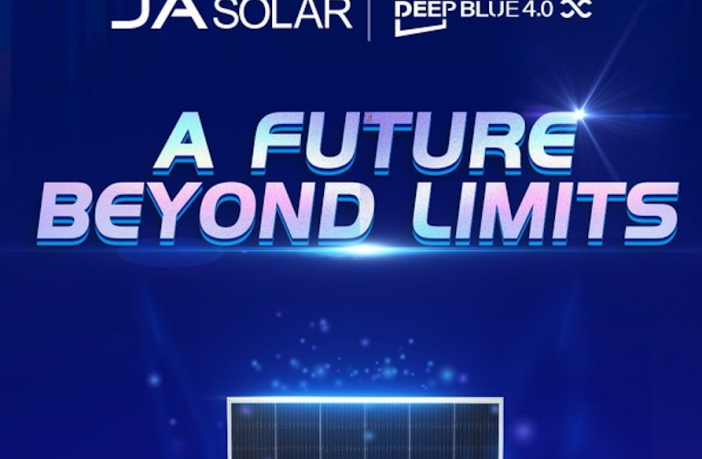- JA Solar celebrates its 2022 new product launch event on May 18, with the release of its first n-type PV module DeepBlue 4.0 X.
- This innovative new product offering marks the company’s first entry into the n-type PV product market.
Based on the 182 wafer, which boasts the most mature supply chain and industry-wide recognition, the DeepBlue 4.0 X series includes three module types adaptable to any scenario: 54-cell module for residential PV systems, 72-cell and 78-cell for commercial and utility-scale PV projects.
DeepBlue 4.0 X has already passed the IEC 61215 and IEC 61730 tests and obtained the TÜV SÜD certificate, as well as passed the salt mist, ammonia, sand and dust testing, proving its suitability across various applications and environments.
DeepBlue 4.0 X also integrates the latest technologies from JA Solar, including the Bycium+ cell, wherein mass production efficiency can reach more than 24.8% owing to its high-quality substrate and structure. DeepBlue 4.0 X is equipped with the patented high-density module encapsulation technology GFI (Gapless flexible interconnection), where the design of the round ribbon with buffer treatment and optimized encapsulation material deals with mechanical stress at cell interconnections and thus eliminating the risk of micro-cracking.
Related news: JA Solar enters energy storage market with strategic partner
All this means is higher reliability and higher energy yield with DeepBlue 4.0 X, with maximum power reaching 625W and efficiency of up to 22.4%.
According to Kun Tang, Director of the Product Technology Department at JA Solar, JA Solar has been working on the n-type technology for years, and after continuous investment in R&D and experimentation, is finally ready for mass production. To verify the power generation performance of the product, JA Solar and TÜV NORD launched a one-year (February 2021-February 2022) energy yield test at China Photovoltaic Test Center, Yinchuan base (Northwest China).
The results show that the energy yield of the n-type module based on Bycium+ cells is 3.9% higher than that of p-PERC modules. According to JA Solar PV system simulation data, compared with p-type modules, BOS cost reduction of DeepBlue 4.0 X tops out at 2.1%, and LCOE at 4.6%, further increasing the IRR and bringing more value to the customer.
Mr. Xinwei Niu, Member of the Board and Senior Vice President of JA Solar, said, “The development of low-carbon and green solutions has become a key global mission. As one of the most flexible and cost-effective renewable energy, PV power has become an important force in promoting carbon neutrality. From p-type to n-type, from DeepBlue 3.0 to DeepBlue 4.0 X, JA Solar has always adhered to the product design concept of ‘customer oriented’. We are always trying to improve the power generation performance of PV modules in order to create more value for customers and promote the application of PV power at a global scale to play a greater role in the process of global carbon neutrality.”
For sales enquiries on the African continent, send Victor Musau an email: musau.victor@jasolar.com
Author: Bryan Groenendaal












